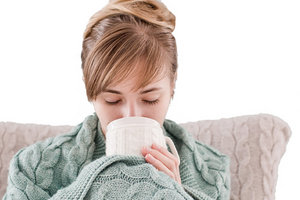The winter season is upon us and offers unique challenges for the clinician and patient alike. To effectively navigate through the winter season there are two main TCM medicinals, Huang Qi and Gan Jiang, to consider, as well as two important formulas which feature these two TCM treasures.
Huang Qi(Astragalus Radix) has a sweet taste and a slightly warming nature, which makes it a perfect choice for gently and effectively boosting the health and vitality during the winter months. Huang Qiis a prime herb for boosting and warming the Qi, particularly the Spleen Qi, which in turn nourishes and supports the Wei Qi. Huang Qi is a gentle herb and is best taken daily over the entire winter season with very few contraindications and even those tend to be overblown by most clinicians. The majority of patients I see in the modern clinic suffer from significant Spleen QiVacuity, which results in an overall deficient state presenting with chronic fatigue, heavy feelings in the body, and susceptibility to colds and flu. Huang Qiis much less expensive than Ren Shen and more gentle, which lends itself to less issues with contraindications and side effects due to long-term use of tonics. Huang Qiis easily taken in capsules or tea and can even be used as ingredients in soups and stews, especially used in conjunction with bone broth soups.
 The formula, built around Huang Qi, and perhaps my all-time TCM favorite is Bu Zhong Yi Qi Tang ( Tonify the Middle to Augment the Qi Decoction). Formulated by Li Dong-Yuan, the renowned Jin Dynasty doctor, it is an excellent choice for boosting the Qi, coursing the Qi, and gently nourishing the Blood, all key actions for the prevention of the invasion of Wind Heat and Wind Cold in the winter season. I often have patients take this formulas along with capsules or tea of Huang Qi, or along with bone broth soup with Huang Qi root added. This combination of formula taken in conjunction with single medicinals can be very effective for preventing the usual cold and flu issues during the winter season and prepare the body to quickly and effectively clear invasions of Wind Heat or Wind Cold when such challenges arrive.
The formula, built around Huang Qi, and perhaps my all-time TCM favorite is Bu Zhong Yi Qi Tang ( Tonify the Middle to Augment the Qi Decoction). Formulated by Li Dong-Yuan, the renowned Jin Dynasty doctor, it is an excellent choice for boosting the Qi, coursing the Qi, and gently nourishing the Blood, all key actions for the prevention of the invasion of Wind Heat and Wind Cold in the winter season. I often have patients take this formulas along with capsules or tea of Huang Qi, or along with bone broth soup with Huang Qi root added. This combination of formula taken in conjunction with single medicinals can be very effective for preventing the usual cold and flu issues during the winter season and prepare the body to quickly and effectively clear invasions of Wind Heat or Wind Cold when such challenges arrive.
 The medicinalGan Jiang(Zingiberis Rhizoma) or dried ginger is hot in nature with an acrid taste, but an important herb to warm the body and treat nausea/vomiting; cold and painful joints; and poor appetite to name a few common indications, which manifest during the cold winter months. The winter season is also a time when patients eat too many heavy, fatty foods, which can lead to gastric issues. Therefore, I always encourage patients to keep ginger capsules on hand for such seasonal excess issues. Patients can easily combine the medicinals Huang Qiand Gan Jiang in capsule form as low-dose daily tonics with little to no concern during the winter months, especially if the patient exhibits a cold or vacuous constitution.
The medicinalGan Jiang(Zingiberis Rhizoma) or dried ginger is hot in nature with an acrid taste, but an important herb to warm the body and treat nausea/vomiting; cold and painful joints; and poor appetite to name a few common indications, which manifest during the cold winter months. The winter season is also a time when patients eat too many heavy, fatty foods, which can lead to gastric issues. Therefore, I always encourage patients to keep ginger capsules on hand for such seasonal excess issues. Patients can easily combine the medicinals Huang Qiand Gan Jiang in capsule form as low-dose daily tonics with little to no concern during the winter months, especially if the patient exhibits a cold or vacuous constitution.
The formula Li Zhong Wan (Regulate the Middle Pill) from the classic text Shang Han Lun is another excellent formula for patients to use during the winter months and gluttonous holiday season. This simple and elegant four-herb formula, which features Gan Jiang is a powerful tonic for boosting the Spleen Qi and warming the body. I often have patients take this in lieu of Yu Ping Feng San(Jade Windscreen Power) to help prevent the issues of colds and flu, as well as avoid common gastric complaints which so often manifest when the diet is heavy on holiday foods. Adding the medicinal Huang Qito the formula Li Zhong Wan is also highly effective and adds even more efficacy to the Qi, boosting qualities of the formula.
I hope some of these simple herbal explorations stimulate some creative ideas for clinicians to empower patients to avoid the common winter issues. Instead of waiting for sickness to arrive, it's always best to help the patient avoid these issues altogether. We must always remember the words of the classic text Ling Shu, "The superior physician treats that which is not yet ill. The inferior physician treats that which is already ill."
Click here for more information about Craig Williams, LAc, AHG.




